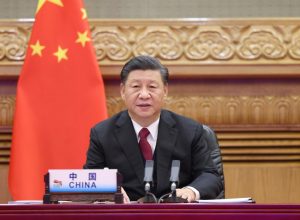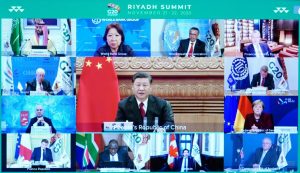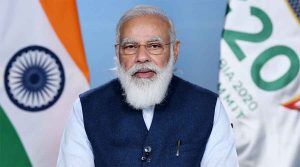
In a big-picture speech at the G20 summit of the world’s most advanced economies, Chinese President Xi Jinping exhorted the member countries to construct a “global firewall” against COVID-19 and underlined the critical importance of continuously advancing global poverty reduction to create an inclusive, sustainable and resilient future.
Addressing the Group of 20 (G20) Riyadh Summit via a video link, President Xi said the group has once again played an “important and irreplaceable” role in the global war against the pandemic which has “impacted the world in a more profound way than the 2008 global financial crisis did.”
“To contain the virus, stabilize the economy and protect livelihood remains a long and arduous journey for all countries,” Mr Xi said. “While containing the virus, we must also stabilize and restore economic growth.”
“We need substantial measures more than ever in the face of COVID-19,” Mr Xi said.
Inclusive Development

Mr Xi stressed the need to uphold the vision of prioritizing development. He called for efforts to strengthen development cooperation and narrow the North-South gap in implementing the United Nations 2030 Agenda for Sustainable Development. Calling for adopting comprehensive and balanced policies, President Xi said targeted measures must be taken to tackle poverty caused by COVID-19.
Underscoring the role of digital technology in poverty alleviation, President Xi called for efforts to create more opportunities for small and medium-sized enterprises, women, youth and other vulnerable groups to move from poverty to prosperity.
The Chinese leader also underscored the importance of upholding multilateralism, openness, and inclusiveness to promote “mutually beneficial cooperation”. “The COVID-19 has exposed the deficiencies of global governance. The international community has a keen interest in the post-COVID international order and global governance as well as the future role for the G20,” he said.
“President Xi Jinping’s speech at the G20 was very statesman-like and underlined the need for unity among major economies to tackle the collective scourge of the pandemic. He offered a lot of constructive suggestions for reviving global economic growth,” said Manish Chand, CEO & Editor-in-Chief, India Writes Network and India and the World magazine.

“President Xi’s advocacy of multilateralism and warning against unilateralism and narrow nationalism is similar to what Prime Minister Narendra Modi has espoused at G20 and other multilateral forums,” he said. “The fact that both the Chinese President and India’s Prime Minister spoke about buttressing multilateralism at both G20 and BRICS summit shows that despite the border standoff, the two countries haven’t stopped cooperation on multilateral issues. There is a convergence between India and China on many global issues,” said Mr Chand.
“To contain the virus, stabilize the economy and protect livelihood remains a long and arduous journey for all countries,” President Xi said. “While containing the virus, we must also stabilize and restore economic growth.”
The G20 Summit was held virtually under the chairmanship of Saudi Arabia. President Xi lauded the G20’s “swift actions” in the wake of COVID-19 which helped “advance vaccine research, maintain economic stability, keep supply chains open, and ease the debt burden of developing countries” while enhancing international cooperation and confidence against the virus.
Noting that the recovery can be “a long and arduous journey”, he drew attention to the “fast-evolving” international situation, marked by “rising unilateralism and protectionism”. He called on the member-states for more efforts not just to contain the virus, but also to restore the economy. Besides cooperation in vaccine research and production, the members must extend more support to the WHO in mobilizing and consolidating resources and distributing vaccines.
He reiterated China’s commitment to providing accessible and affordable vaccines as well as other healthcare support to the developing countries.
On the economy, he said, “We need to secure the industrial supply chains, reduce tariffs and barriers, explore trade liberalization of key medical supplies, harmonize policies and standards, and establish ‘fast tracks’ to facilitate the orderly flow of personnel.” He said that China has proposed a global mechanism on mutual recognition of health certificates, based on the nucleic acid test results in the form of internationally accepted QR codes. “We hope more countries will join this mechanism,” he said.
Moreover, the pandemic has fueled the boom of new technologies, businesses, and platforms such as 5G, artificial intelligence, smart cities, and the development of a contact-free economy like online shopping, online education, and telemedicine. “All this opens new pathways for economic growth, and we ought to turn crisis into opportunity,” he said.
(Sanjeeb Baruah contributed inputs for this article)
Author Profile
- India Writes Network (www.indiawrites.org) is an emerging think tank and a media-publishing company focused on international affairs & the India Story. Centre for Global India Insights is the research arm of India Writes Network. To subscribe to India and the World, write to editor@indiawrites.org. A venture of TGII Media Private Limited, a leading media, publishing and consultancy company, IWN has carved a niche for balanced and exhaustive reporting and analysis of international affairs. Eminent personalities, politicians, diplomats, authors, strategy gurus and news-makers have contributed to India Writes Network, as also “India and the World,” a magazine focused on global affairs.
Latest entries
 DiplomacyJanuary 5, 2026India walks diplomatic tightrope over US operation in Venezuela
DiplomacyJanuary 5, 2026India walks diplomatic tightrope over US operation in Venezuela India and the WorldNovember 26, 2025G20@20: Africa’s Moment – The Once and Future World Order
India and the WorldNovember 26, 2025G20@20: Africa’s Moment – The Once and Future World Order DiplomacyOctober 4, 2025UNGA Resolution 2758 Must Not Be Distorted, One-China Principle Brooks No Challenge
DiplomacyOctober 4, 2025UNGA Resolution 2758 Must Not Be Distorted, One-China Principle Brooks No Challenge India and the WorldJuly 26, 2025MPs, diplomats laud Operation Sindoor, call for national unity to combat Pakistan-sponsored terror
India and the WorldJuly 26, 2025MPs, diplomats laud Operation Sindoor, call for national unity to combat Pakistan-sponsored terror







